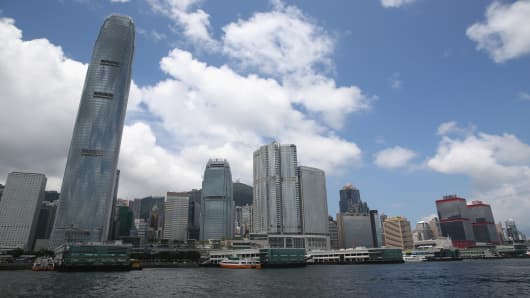Nam Kee Noodles is a typical Hong Kong restaurant: functional, popular and busy.
A dozen plastic-topped tables offer room for about 40 patrons. Customers line up outside at lunchtime, waiting to consume spicy noodle soup, dumplings and iced soy milk amid the clatter of plastic bowls and chopsticks.
In April, however, the little restaurant, in the heart of Causeway Bay, one of Hong Kong's busiest shopping districts, nearly had to shut down after the landlord tripled the already-expensive rent.
"We were paying around 200,000 dollars a month," said Au Kei-hong, the shop's manager, referring to an amount in Hong Kong dollars equivalent to about $25,800. "But the landlord then increased it to 600,000. It was too expensive. We cannot afford that."
After frantic negotiations, Mr. Au agreed to a smaller — though still steep — increase that has allowed him to stay put for an additional year.
(Read More: Hong Kong Has World's Most Expensive Retail Space: Report)
Others have not been so lucky. Soaring rents have forced at least three small businesses on the same Causeway Bay street to move or close in the last few months, and similar tales of woe are common among small businesses in other prime areas in the bustling, crowded city.
Rapid growth and sweeping economic changes have raised retail rents in many of Asia's growing metropolises in recent years. But nowhere have they reached the heights of Hong Kong, a banking, logistics and trading hub that many companies see as a testing ground and launching pad for the vastly larger mainland Chinese market.
Hong Kong's residential property prices have fallen from their recent highs mainly because of government measures intended to cool demand — but those measures do not affect retail rents.
"It's a normal phenomenon for small retailers to be squeezed out by high rents. It happens everywhere," said Joe Lin, executive director of retail services at the real estate services firm CBRE in Hong Kong.
"But in Hong Kong, the pressures have become very severe in the last two to three years — it's very unhealthy. Luxury and jewelry now dominate 90 percent of the space in prime locations," Mr. Lin said. "The whole trade mix in some of these areas has changed."
Causeway Bay, where Nam Kee Noodles is struggling to survive among high-end clothing and watch retailers, commands the most expensive retail rents in the world: an average of 1,950 Hong Kong dollars, or $251, per square foot per month, according to figures for the first quarter of 2013 from Cushman & Wakefield, a real estate consulting firm.
(Read More: World's Most Expensive City to Rent Is...)
Two other Hong Kong neighborhoods, Tsim Sha Tsui and Central, also rank among the five most expensive locations in the world — with Fifth Avenue and Times Square in New York — easily topping luxury shopping destinations like the Champs-Élysées in Paris and the Ginza in Tokyo.
That has squeezed out many of the colorful mom and pop stores — hardware shops, fruit stalls, herbal medicine vendors, restaurants — that form a large part of Hong Kong's business ecosystem, changing the face of many neighborhoods in the process.
A few minutes' walk from Central, which is home to Hong Kong's financial district, Ngau Kee Food Cafe, which for many years sold traditional Cantonese dishes to diners perched on rickety stools, closed in April after the landlord raised the monthly rent to 120,000 dollars from 49,000.
The restaurant's owner, Mak Ping-kuen, says he hopes to reopen in another part of town but has struggled to find a site.
"I hope we can reopen as soon as possible. My customers are getting impatient," he said.


